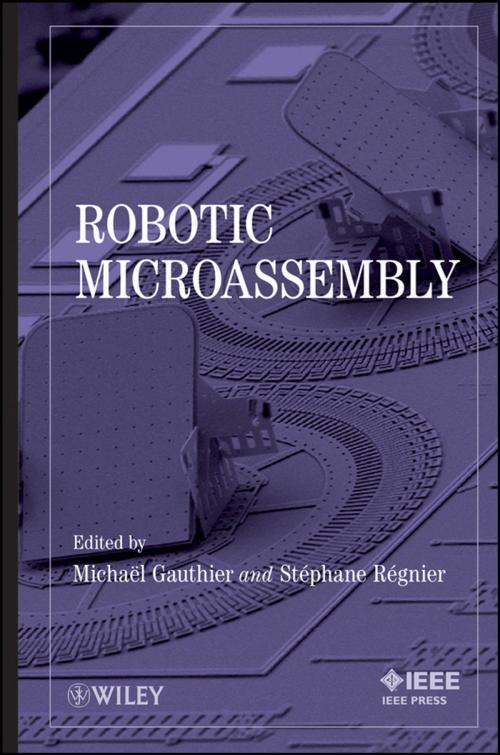| Author: | ISBN: | 9781118060339 | |
| Publisher: | Wiley | Publication: | January 14, 2011 |
| Imprint: | Wiley-IEEE Press | Language: | English |
| Author: | |
| ISBN: | 9781118060339 |
| Publisher: | Wiley |
| Publication: | January 14, 2011 |
| Imprint: | Wiley-IEEE Press |
| Language: | English |
Discover the latest models and methods for robotic microassembly from around the world
This book presents and analyzes new and emerging models and methods developed around the world for robotic microassembly, a new and innovative way to produce better microsystems. By exploring everything from the physics of micromanipulation to microassembly to microhandling, it provides the first complete overview and review of this rapidly growing field. Robotic Microassembly is divided into three parts:
- Part One: Modeling of the Microworld
- Part Two: Handling Strategies
- Part Three: Robotic and Microassembly
Together, these three parts feature eight chapters contributed by eight different authors. The authors, internationally recognized experts in the field of robotic microassembly, represent research laboratories in Asia, Europe, and North America. As a result, readers get a remarkable perspective on different approaches to robotic microassembly from around the world. Examples provided throughout the chapters help readers better understand how these different approaches work in practice. References at the end of each chapter lead to the primary literature for further investigation of individual topics.
Robotic microassembly offers a new, improved way to manufacture high-performance microelectro-mechanical systems (MEMS). Therefore, any professional or student involved in microrobotics, micromechatronics, self-assembly or MEMS will find plenty of novel ideas and methods in this book that set the stage for new approaches to design and build the next generation of MEMS and microproducts.
Discover the latest models and methods for robotic microassembly from around the world
This book presents and analyzes new and emerging models and methods developed around the world for robotic microassembly, a new and innovative way to produce better microsystems. By exploring everything from the physics of micromanipulation to microassembly to microhandling, it provides the first complete overview and review of this rapidly growing field. Robotic Microassembly is divided into three parts:
- Part One: Modeling of the Microworld
- Part Two: Handling Strategies
- Part Three: Robotic and Microassembly
Together, these three parts feature eight chapters contributed by eight different authors. The authors, internationally recognized experts in the field of robotic microassembly, represent research laboratories in Asia, Europe, and North America. As a result, readers get a remarkable perspective on different approaches to robotic microassembly from around the world. Examples provided throughout the chapters help readers better understand how these different approaches work in practice. References at the end of each chapter lead to the primary literature for further investigation of individual topics.
Robotic microassembly offers a new, improved way to manufacture high-performance microelectro-mechanical systems (MEMS). Therefore, any professional or student involved in microrobotics, micromechatronics, self-assembly or MEMS will find plenty of novel ideas and methods in this book that set the stage for new approaches to design and build the next generation of MEMS and microproducts.















